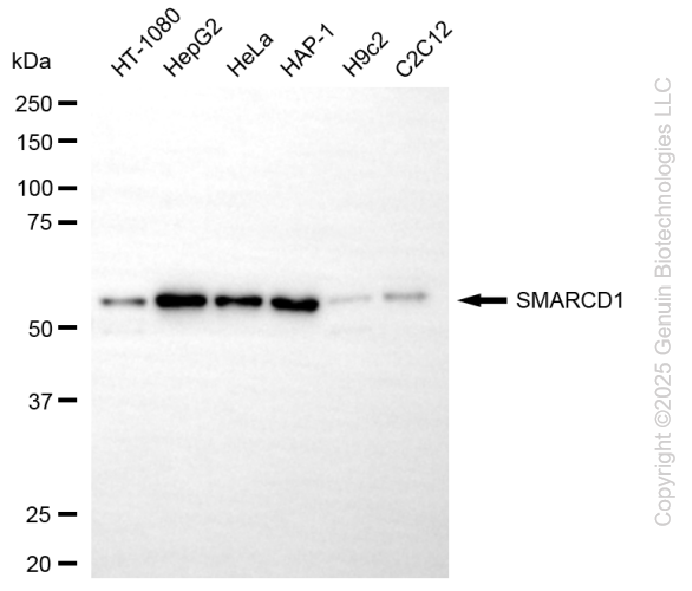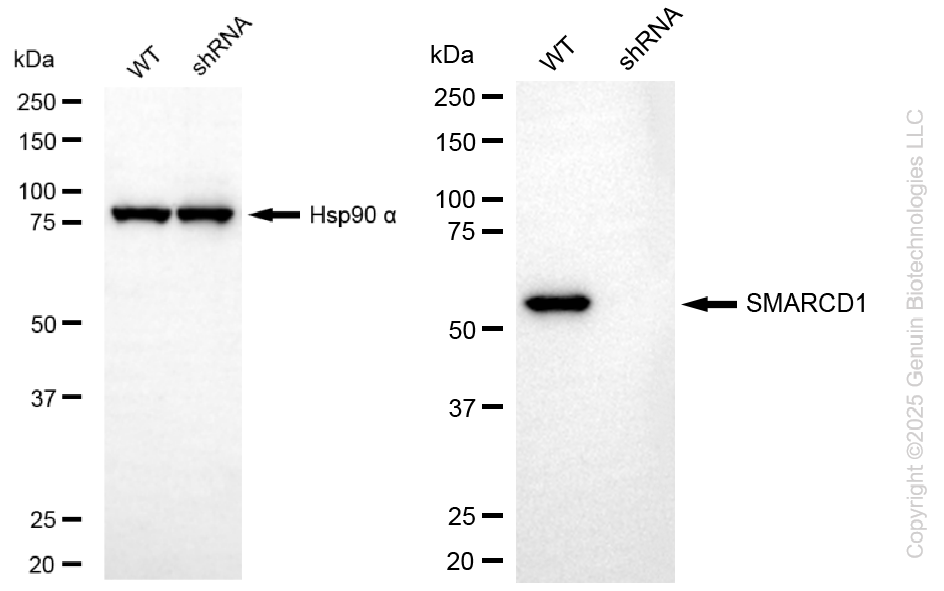KD-Validated Anti-SMARCD1 Rabbit Monoclonal Antibody
Rabbit monoclonal antibody
- SPECIFICATION
- CITATIONS
- PROTOCOLS
- BACKGROUND

Application
| WB |
|---|---|
| Primary Accession | Q96GM5 |
| Reactivity | Rat, Human, Mouse |
| Clonality | Monoclonal |
| Isotype | Rabbit IgG |
| Clone Names | 25GB4745 |
| Calculated MW | Predicted, 58 kDa; observed, 58 kDa |
| Gene Name | SMARCD1 |
| Aliases | SMARCD1; SWI/SNF Related BAF Chromatin Remodeling Complex Subunit D1; BAF60A; SWI/SNF Related, Matrix Associated, Actin Dependent Regulator Of Chromatin, Subfamily D, Member 1; CRACD1; Rsc6p; SWI/SNF-Related Matrix-Associated Actin-Dependent Regulator Of Chromatin Subfamily D Member 1; 60 KDa BRG-1/Brm-Associated Factor Subunit A; BRG1-Associated Factor 60A; Mammalian Chromatin Remodeling Complex BRG1-Associated Factor 60A; Chromatin Remodeling Complex BAF60A Subunit; SWI/SNF Complex 60 KDa Subunit A; SWI/SNF Complex 60 KDa Subunit; Swp73-Like Protein; CSS11 |
| Immunogen | A synthesized peptide derived from human SMARCD1 |
| Gene ID | 6602 |
|---|---|
| Other Names | SWI/SNF-related matrix-associated actin-dependent regulator of chromatin subfamily D member 1, 60 kDa BRG-1/Brm-associated factor subunit A, BRG1-associated factor 60A, BAF60A, SWI/SNF complex 60 kDa subunit, SMARCD1 {ECO:0000312|EMBL:AAD23390.1} |
| Name | SMARCD1 {ECO:0000312|EMBL:AAD23390.1} |
|---|---|
| Function | Involved in transcriptional activation and repression of select genes by chromatin remodeling (alteration of DNA-nucleosome topology). Component of SWI/SNF chromatin remodeling complexes that carry out key enzymatic activities, changing chromatin structure by altering DNA-histone contacts within a nucleosome in an ATP-dependent manner (PubMed:29374058, PubMed:8804307). Belongs to the neural progenitors-specific chromatin remodeling complex (npBAF complex) and the neuron-specific chromatin remodeling complex (nBAF complex). During neural development a switch from a stem/progenitor to a postmitotic chromatin remodeling mechanism occurs as neurons exit the cell cycle and become committed to their adult state. The transition from proliferating neural stem/progenitor cells to postmitotic neurons requires a switch in subunit composition of the npBAF and nBAF complexes. As neural progenitors exit mitosis and differentiate into neurons, npBAF complexes which contain ACTL6A/BAF53A and PHF10/BAF45A, are exchanged for homologous alternative ACTL6B/BAF53B and DPF1/BAF45B or DPF3/BAF45C subunits in neuron-specific complexes (nBAF). The npBAF complex is essential for the self-renewal/proliferative capacity of the multipotent neural stem cells. The nBAF complex along with CREST plays a role regulating the activity of genes essential for dendrite growth (By similarity). Has a strong influence on vitamin D-mediated transcriptional activity from an enhancer vitamin D receptor element (VDRE). May be a link between mammalian SWI-SNF-like chromatin remodeling complexes and the vitamin D receptor (VDR) heterodimer (PubMed:14698202). Mediates critical interactions between nuclear receptors and the BRG1/SMARCA4 chromatin-remodeling complex for transactivation (PubMed:12917342). Interacts with AKIRIN2 (By similarity). |
| Cellular Location | Nucleus {ECO:0000269|PubMed:8804307, ECO:0000305} |
| Tissue Location | Expressed in all tissues tested, including brain, heart, kidney, liver, lung, muscle, pancreas and placenta |

Thousands of laboratories across the world have published research that depended on the performance of antibodies from Abcepta to advance their research. Check out links to articles that cite our products in major peer-reviewed journals, organized by research category.
info@abcepta.com, and receive a free "I Love Antibodies" mug.
Provided below are standard protocols that you may find useful for product applications.
If you have used an Abcepta product and would like to share how it has performed, please click on the "Submit Review" button and provide the requested information. Our staff will examine and post your review and contact you if needed.
If you have any additional inquiries please email technical services at tech@abcepta.com.














 Foundational characteristics of cancer include proliferation, angiogenesis, migration, evasion of apoptosis, and cellular immortality. Find key markers for these cellular processes and antibodies to detect them.
Foundational characteristics of cancer include proliferation, angiogenesis, migration, evasion of apoptosis, and cellular immortality. Find key markers for these cellular processes and antibodies to detect them. The SUMOplot™ Analysis Program predicts and scores sumoylation sites in your protein. SUMOylation is a post-translational modification involved in various cellular processes, such as nuclear-cytosolic transport, transcriptional regulation, apoptosis, protein stability, response to stress, and progression through the cell cycle.
The SUMOplot™ Analysis Program predicts and scores sumoylation sites in your protein. SUMOylation is a post-translational modification involved in various cellular processes, such as nuclear-cytosolic transport, transcriptional regulation, apoptosis, protein stability, response to stress, and progression through the cell cycle. The Autophagy Receptor Motif Plotter predicts and scores autophagy receptor binding sites in your protein. Identifying proteins connected to this pathway is critical to understanding the role of autophagy in physiological as well as pathological processes such as development, differentiation, neurodegenerative diseases, stress, infection, and cancer.
The Autophagy Receptor Motif Plotter predicts and scores autophagy receptor binding sites in your protein. Identifying proteins connected to this pathway is critical to understanding the role of autophagy in physiological as well as pathological processes such as development, differentiation, neurodegenerative diseases, stress, infection, and cancer.



